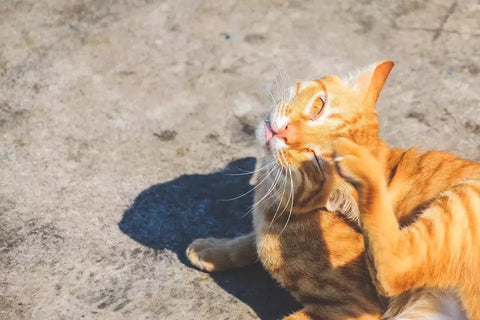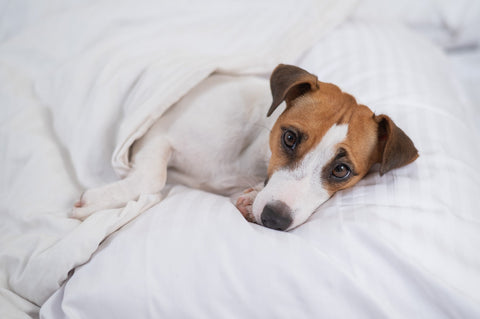Cat diarrhea is a loose bowel movement that happens in your furbaby. It’s a result of fast-moving fecal matter in the gastrointestinal tract that is paired with a decrease in nutrients, water absorption, and electrolytes in the body.
It is very important to take note that diarrhea in cats is not a disease in itself, but if your cat has diarrhea, it can be a sign of several different diseases.
In this article, we’ll talk about the possible causes of cat diarrhea, signs it might be a medical emergency, what you can give your cat, and how it can be treated.
Normal Cat Poop
The majority of cats will poop once or twice a day. If your cat is not going through any digestive upset, their normal poop should:
- Not have a very strong, foul odor
- Be brown to deep brown in color, but not too dark, as blackish poop can mean a presence of blood
- Be generally malleable (not too soft or too hard)
- Not be liquid-like that has no observable shape
Though not all abnormal cat poop is a cause of concern, it does demand keen observation. This can be an indication that your furbaby may be suffering from diarrhea.
Symptoms of Diarrhea in Cats
Together with having unusual poop, cats diarrhea will also come with these other symptoms:
- Mucus or blood in poop
- Presence of worms
- Poop accidents in different areas of the house
- Pooping watery stools more than twice a day
- Watery stools for more than two days
- Straining to poop
- Lethargy
- Refusal to eat and/or drink
- Vomiting
- Abdominal pain
- Sunken eyes
- Pale gums
Seek medical care if your cat has diarrhea along with one or more of these symptoms. If you notice cat vomiting and diarrhea, call your vet immediately. Even with no other symptoms, if diarrhea lasts for several days, take your cat to the vet as soon as possible, as it is considered a medical emergency. Diarrhea in cats can quickly lead to dehydration and other issues.
Why Does My Cat Have Diarrhea?
Usually, diarrhea in cats is fairly easy to identify without too much research. But, learning the causes of your cat’s diarrhea can be more of a challenge. Diarrhea is a symptom of certain diseases and illnesses, the reason behind it ranges from simple to complicated and life-threatening.
Cats have sensitive stomachs. Your cat might have diarrhea because of a change in their diet or a reaction to something they ate. Trying out new brands or formulas of food may cause diarrhea. Ingesting non-food items, harmful household products, and toxic plants are also possible reasons as it alters the natural intestinal environment of your cat.
Other potential reasons that cause cat diarrhea include:
- Stress and anxiety
- Side effects of antibiotics and medications
- Bacterial infections
- Viral infections
- Parasite infestations, like tapeworms, roundworms, and hookworms
- Inflammatory Bowel Disease (IBD), where the gastrointestinal tract becomes irritated and inflamed
- Pancreatitis, an inflammation of the pancreas that has been associated with cats ingesting poisons, acquiring parasitic infections, or enduring severe trauma from accidents
- Hyperthyroidism, caused by an increase in the production of thyroid hormones that help regulate cat metabolism
- Liver disease
- Kidney disease
- Cancer

Food to Give a Cat with Diarrhea
You should be very careful with what you give your cat with diarrhea. Diarrhea, if not managed immediately, can easily cause dehydration. A number of cats are not fond of drinking enough water as it is, so it’s best that you provide them with fresh water in different accessible areas in your house to help prevent cat dehydration. You can even use running water bowls to peak their interest. Don’t forget to place Pawtect® Pads under the water bowls just in case your cat gets messy when drinking.
However, providing enough water is not a treatment. Treating cat diarrhea must with over-the-counter pet medicines or human medicines may cause more harm than good, so don’t try to medicate without guidance. Also, don’t give your cat any new food, treats, or supplements unless prescribed when they are experiencing diarrhea. Anything new on their stomach may worsen a cat’s diarrhea. It is important that you talk with your veterinarian first to make sure that your cat is given the safe and proper treatment.
If your cat with diarrhea is not making it to their litter box, you can use cat diapers. Yes, they exist. Pet Parents® Cat Diapers are wonderful for preventing messes when your cat has diarrhea. They provide a comfy, snug fit that prevents leaks so that your cat does not have to stay confined to a specific room while they are sick. These diapers for cats were designed to prevent diarrhea accidents from turning into messes. Pet Parents® Cat Diapers are washable and have sewn-in pads that can keep both pee and poop messes inside. They feature leak-proof, waterproof shells that make sure messes stay inside the diaper.
"Pet Parents® Washable Cat Diapers have sewn-in pads that can keep in both pee and poop messes."
Consider placing Pawtect® Pads place under litter boxes, just in case your cat misses when pooping or tracks anything out of the litter box. These washable pee pads will help to prevent further messes from being spread across your home.
What Can I Give My Cat for Diarrhea?
There is no exact treatment for cat diarrhea that fits all cases as the treatment greatly depends on what causes diarrhea in your cat.

If your cat’s diarrhea is caused by intestinal parasites, parasite-killing medications or deworming may be suggested by your veterinarian, and a parasite prevention treatment plan will be strongly recommended after your furbaby has recovered.
If it’s caused by food allergies, your vet may suggest you go back to what you have been feeding your cat. They may also perform food trials to evaluate your furbaby’s reaction to certain foods.
If diarrhea is caused by underlying diseases, your vet’s ideal approach is to diagnose, manage, and treat the disease. Because of the many possible causes, it is best to consult a vet if your cat is experiencing diarrhea.
Vet Checks for Cat Diarrhea
Check with your veterinarian. If your cat has diarrhea, your vet may perform different exams to help determine what’s causing diarrhea. Then, they will be able to prescrible an anti-diarrhea mediation for cats or treatment plan. According to Hill’s Pet, your vet may perform the following on your cat with diarrhea:
- A physical examination
- Complete blood count
- Fecal exam
- X-ray
- Ultrasound
- Endoscopy/colonoscopy
- Medication trials to help assess your cat’s response to certain medications
- Food trials to assessing your cat’s reaction to certain foods
Provide a detailed medical history. Your vet will certainly ask you about your cat’s medical history and symptoms. VCA Hospitals advises that you present your veterinarian with a detailed one. Write down all things you have observed on the onset of diarrhea in your cat in sequential order. These questions may help you:
- What changes have you made in your cat’s diet?
- What did your cat eat in the last two weeks?
- What does your cat’s poop look like? Is it watery? What is the color? What is the smell?
- Is your cat showing any other signs, like vomiting, poop accidents, presence of blood in poop, and the like?
Provide good nutrition. Nutrition is key to a healthy cat. Provide your cat with a healthy, balanced diet. Supplements can help support nutritional needs and strengthen their immune system. To help prevent diarrhea, a diet rich in digestible complex carbohydrates and fiber is recommended.
While cat diarrhea can be a challenge for you and your furbaby, with the right treatment and guidance from your veterinarian, you can manage and treat your cat with diarrhea.









